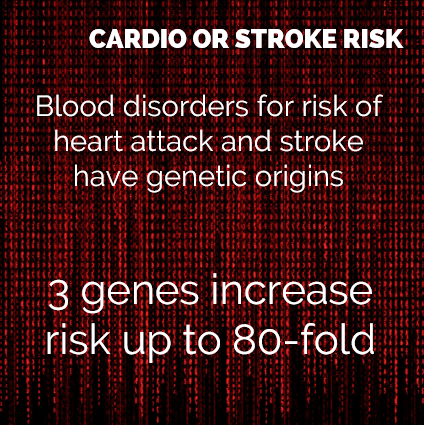Heart Attack and Stroke Risk: Thrombophilia
Blood clotting is regulated by your genes. Some people have a high propensity of clotting which can lead to high risk of developing heart attack, stroke, pulmonary embolism, or venous thrombosis. This test is for you:
-
Heart disease or Stroke below 50 years’ age
-
Family history of clotting disorders
-
Family history of Heart disease or Stroke below 50 years’ age
-
Assess Risk of Heart attack and Stroke
Prevention is better than cure indeed both in terms of saving money, as well as in maintaining a great quality of life!
The report will guide you on the risk of developing vascular (blood circulation system) complications that lead to cardiovascular, cerebrovascular, and related debilitating diseases. Knowing this risk will allow you to better manage your health and life in consulation with your doctor.
FAQ
Being a thrombophiliac, do I need life-long therapy?
Not all people with mutations predisposing to thrombophilia need anti-thrombotic medication. It is usually given in the presence of added risk, or personal/family history of such events. Consult your doctor with the report, who is best positioned to advise you regarding therapeutic actions with your whole clinical picture in mind.
If I have thrombophilia, will I have heart attack or stroke?
Not necessary. Studies show that people with any of these three mutations have higher chances of cardio/cerebrovascular disease. Not that everyone with these mutations have disease.
 I have had a cryptogenic myocardial infarction or stroke. Will this test benefit me?
I have had a cryptogenic myocardial infarction or stroke. Will this test benefit me?
Yes. Cryptogenic means unknown etiology, or absence of conventional risk factors. In such a case, mutations in Factor V, Factor II, and SERPINE1 have been shown to be causative, and may help in therapy.
Are other causes of thrombophilia linked to cardio/cerebrovascular disease?
Various mutations in Protein C, Protein S and antithrombin are causative of thrombophilia, but their link to cardiac and cerebral disease is not very well established.
Science
Genes tested: Factor V Leiden, Factor II Prothrombin, and PAI-1 (SERPINE1)
Blood clotting is a natural condition that is very healthy in wound healing. However, a section of the population carry genetic mutations that highly increases the tendency of their blood to clot. This increased clotting can increase the risk of blocks similar to those in heart attack, stroke, and pregnancy complications. These people also frequently experience emergency conditions such as deep vein thrombosis (DVT), pulmonary embolism, and other venous thrombotic diseases.
